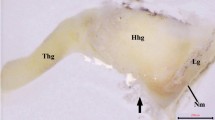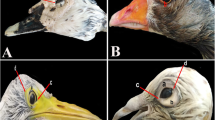Abstract
The anatomical, histological, histochemical and ultrastructural characteristics of the Harderian gland of the armadillo Chaetophractus villosus were described. The gland is the largest structure in the bony orbit. It is situated in the anteroventral region of the orbit. Obvious structural differences are not observed between males and females. The gland is compound-branched tubulo-alveolar, being characterized by a single layer of columnar cells surrounded by myoepithelial cells. It possesses a single excretory duct opened into the inner canthus. All glandular cells show yellow-green autofluorescence and additionally some glandular lumen may contain dense autofluorescent solid accretions. There are two peculiar and outstanding cytoplasmic features. One is represented by the smooth endoplasmic reticulum (SER), forming a closely woven meshwork. The other one is represented by “membranous bodies” apparently derived from the SER, RER and cytoskeleton with a “Star of David” configuration situated in the supranuclear region. Three types of vesicles are detected in the cytoplasm. Histochemical staining methods reveal lipids, proteins, neutral and acidic containing glycoconjugates in secretory vesicles. The mechanism of secretion appears either merocrine or apocrine. The epithelium of the intra- and inter-lobular excretory ducts suggests secretory activity. Tubulo-acinar glands similar to those seen in the lacrimal gland and nictitans glands are found related to the intralobular and main excretory ducts. The capillary network is characterized by fenestrated endothelium. The stroma possesses unmyelinated axons and plasma cells. The normal secretion of the secretory endpieces, particularly lipids, proteins and glycoconjugates, is complemented by mucous and serous secretions released by ductal cells and glands associated to the ducts.











Similar content being viewed by others
References
Aldana Marcos HJ (1996) Experimental study of two peculiar structures of the armadillo Chaetophractus villosus: the Onuf’s nucleus and the Harderian gland. Doctoral Thesis, University of Buenos Aires, Buenos Aires, T2853
Aldana Marcos HJ, Ferrari CC, Cervino CO, Affanni JM (2002) Histology, histochemistry and fine structure of the lacrimal and nictitans gland in the South American Armadillo Chaetophractus villosus (Xenarthra, Mammalia). Exp Eye Res 75:731–744
Antolín-González I, Uria H, Tolivia D, Menendez-Pelaez A (1993) The Harderian gland of the rodent Octodon degus: a structural and ultrastructural study. Tissue Cell 25:129–139
Atoji Y, Sugimura M, Suzuki Y (1989a) The preputial gland of the Japanese serow Capricornis crispus. Acta Anat 134:245–252
Atoji Y, Sugimura M, Suzuki Y (1989b) Sebaceous glands of the infraorbital gland of the Japanese serow Capricornis crispus. J Submicrosc Cytol Pathol 21:375–383
Bayliss Hight OB (1992) Lipids. In: Bancroft JD, Stevens A (eds) Theory and practice of histological techniques. Churchill Livingstone, New York, pp 215–244
Bell M (1974) A comparative study of the ultrastructure of the sebaceous glands of man and other primates. J Invest Dermatol 62:132–143
Benítez I, Aldana Marcos HJ, Affanni JM (1994) The encephalon of Chaetophractus villosus. A general view of its most salient features. Comunicaciones Biológicas 12:57–73
Bodyak ND, Stepanova LV (1994) Harderian gland ultrastructure of the black sea bottlenose dolphin (Tursiops truncatus ponticus). J Morphol 220:207–221
Brownscheidle CM, Niewenhuis RJ (1978) Ultrastructure of the Harderian gland in male albino rats. Anat Rec 190:735–754
Bucana C, Nadakavukaren MJ (1972) Fine structure of the Hamster Harderian Gland. Z Zellforsch 129:178–187
Butler JM, Ruskell GL, Cole DF, Unger WG, Zhang SQ, Blank MA, McGregor GP, Bloom SR (1984) Effects of VIIth (facial) nerve degeneration on vasoactive intestinal polypeptide and substance P levels in ocular and orbital tissues of the rabbit. Exp Eye Res 39:523–532
Buzzell GR (1996) The Harderian gland: perspectives. Microsc Res Tech 34:2–5
Buzzell R, Menendez-Pelaez A (1992) The interrelationship between the Harderian glands and the neuroendocrine-thyroid axis in rodents. In: Webb SM, Hoffman RA, Puig-Domingo ML, Reiter RJ (eds) Harderian glands. Springer, Berlin Heidelberg New York, pp 255–270
Cohn SA (1955) Histochemical observations on the Harderian gland of the albino mouse. J Histochem Cytochem 3:342–353
Coto-Montes A, Tomá-Zapico C, Escames G, León J, Tolivia D, Rodríguez-Colunga J, Acuña-Castroviejo D (2003) Characterization of melatonin high-affinity binding sites in purified cell nuclei of the hamster (Mesocricetus auratus) Harderian gland. J Pineal Res 34:202–207
Cui ZJ, Zhou YD, Satoh Y, Habara Y (2003) A physiological role for protoporphyrin IX photodynamic action in the rat Harderian gland? Acta Physiol Scand 179:149–154
Culling CFA, Reid PE, Dunn WL, Clay MG (1974) The histochemical demonstration of O-acylated sialic acids in gastrointestinal mucins. Their association with the potassium hydroxide-periodic acid-Schiff effect. J Histochem Cytochem 22:826–831
Davis FA (1929) The anatomy and histology of the eye and orbit of the rabbit. Trans Am Ophthalmol Soc 27:401–441
Djeridane Y (1994) The Harderian gland and its excretory duct in the Wistar rat. A histological and ultrastructural study. J Anat 3:553–566
Djeridane Y (1996) Comparative histological and ultrastructural studies of the Harderian gland of rodents. Microsc Res Tech 34:28–38
Djeridane Y, Touitou Y (2001) Melatonin synthesis in the rat Harderian gland: age- and time-related effects. Exp Eye Res 72:487–492
Gartner LP, Hiatt JL (2001) Epithelium and glands. In: Color textbook of histology. Elsevier, New York, pp 70-91
Gesase AP, Satoh Y, Ono K (1996) Secretagogue-induced apocrine secretion in the Harderian gland of the rat. Cell Tissue Res 285:501–507
Hoffman RA, Johnson LB, Reiter RJ (1985) Harderian glands of golden hamsters: temporal and sexual differences in immunoreactive melatonin . J Pineal Res 2:161–168
Hostetler JR, Cannon MS, Belt WD (1976) Crystalloid configurations in the adrenal cortex of the siamese tree shrew (Tupaia glis). Anat Rec 185:381–388
Huhtala A, Huikuri KT, Palkama A, Tervo T (1977) Innervation of the rat Harderian gland by adrenergic and cholinergic nerves fibres. Anat Rec 188:263–272
Jenkinson DM, Elder HY, Montgomery I, Moss VA (1985) Comparative studies of the ultrastructure of the sebaceous gland. Tissue Cell 17:683–698
Johnston HS, McGadey J, Thompson GG, Moore MR, Payne AP (1983) The Harderian gland, its secretory duct and porphyrin content in the mongolian gerbil (Meriones unguiculatus). J Anat 137:615–630
Johnston HS, McGadey J, Payne AP, Thompson GG, Moore MR (1987) The Harderian gland, its secretory duct and porphyrin content in the woodmouse (Apodemus sylvaticus). J Anat 153:17–30
Kennedy GY (1970) Harderoporphyrin: a new porphyrin from the Harderian gland of the rat. Comp Biochem Physiol 36:21–36
Kessel RG (1998) The eukaryotic cell: the plasma membrane and cytoplasmic organelles. In: Basic medical histology. The biology of cells, tissues, and organs. Oxford University Press, New York, pp 18–57
Krause WJ, McMenamin PG (1992) Morphological observations on the Harderian gland of the North American opossum (Didelphis virginiana). Anat Embryol 186:145–152
Kühnel W (1992) Morphology of the Harderian gland in the rabbit. A short review. In: Webb SM, Hoffman RA, Puig-Domingo ML, Reiter RJ (eds.) Harderian glands. Springer, Berlin Heidelberg New York, pp 109–125
Lecaque D, Secchi J (1982) Ultrastructural changes of sebaceous glands in castrated and testosterone-treated male rats. A qualitative and quantitative study. Cell Tissue Res 226:621–628
Loewenthal N (1892a) Notiz über die HARDER’sche Drüse des Igels. Anat Anz 7:48–54
Loewenthal N (1892b) Beitrag zur kenntnis der Harder’schen drüse bei den säugetieren. Anat Anz 7:546–556
López JM, Alvarez-Uría M (1994) Effects of ovariectomy and ageing on the structure and ultrastructure of the female Syrian hamster Harderian gland: a stereological analysis. Anat Embryol 189:409–419
Madeley CR (1979) Comparison of the features of astroviruses and caliciviruses seen in samples of feces by electron microscopy. J Infect Dis 139:519–523
Menendez-Pelaez A, Buzzell R (1992) Harderian gland indoles. In: Webb SM, Hoffman RA, Puig-Domingo ML, Reiter RJ (eds) Harderian glands. Springer, Berlin Heidelberg New York, pp 219–234
Merisko EM (1989) Annulate lamellae: an organelle in search of a function. Tissue Cell 21:343–354
Nagato T, Tandler B, Phillips CJ (1984) Unusual smooth endoplasmic reticulum in submandibular acinar cells of the male round-ear bat, Tonatia sylvicola. J Ultrastruct Res 87:275–284
Olcese J, Wesche A (1989) The Harderian gland. Comp Biochem Physiol 93A:655–665
Ortiz GG, Feria-Velasco A, Falcon-Franco MA, Bitzer-Quintero OK, Garcia JJ, Rosales SA, Ruiz-Rizo L, Reiter RJ (2001) Different patterns in the histology and autofluorescence of the Harderian glands of the Syrian hamster, rat, mouse, Mongolian gerbil and guinea pig. Anat Histol Embryol 30:107–115
Payne AP (1994) The Harderian gland: a tercentennial review. J Anat 185:1–49
Pearse AGE (1985) Carbohydrates and mucosubstances. In: Histochemistry. Theoretical and applied, 2, analytical technology. Churchill Livingstone, New York, pp 675–753
Sabry I, Al-Azemi M, Al-Ghaith L (2000) The Harderian gland of the cheesman’s gerbil (Gerbillus cheesmani) of the Kuwaiti desert. Eur J Morphol 38:97–108
Sakai T (1981) The mammalian Harderian gland: morphology, biochemistry, function and phylogeny. Arch Histol Jpn 44:299–333
Sakai T (1989) Major ocular glands (Harderian gland and lacrimal gland) of the Musk Shrew (Suncus murinus) with a review on the comparative anatomy and histology of the mammalian lacrimal glands. J Morphol 201:39–57
Sakai T (1992) Comparative anatomy of mammalian Harderian glands. In: Webb SM, Hoffman RA, Puig-Domingo ML, Reiter RJ (eds) Harderian glands. Springer-Verlag, Berlin Heidelberg New York, pp 7–23
Sakai T, Yohro T (1981) A histological study of the Harderian gland of Mongolian gerbils, Meriones meridianus. Anat Rec 100:259–270
Satoh Y, Gesase AP, Habara Y, Ono K, Kanno T (1996) Lipid secretory mechanisms in the mammalian Harderian gland. Microsc Res Tech 34:104–110
Schreckenberger M, Reuss S (1993) The Harderian gland of the Djungarian hamster (Phodopus sungorus): light- and electron-microscopical investigations. Acta Anat 147:83–88
Shanas U, Terkel J (1997) Mole-rat Harderian gland secretions inhibit aggression. Anim Behav 54:1255–1263
Sheehan DC, Hrapchak BB (1980) Lipids. In: Theory and practice of histotechnology. Mosby, London, pp 202–213
Spicer SS, Schulte BA (1992) Diversity of cell glycoconjugates shown histochemically: a perspective. J Histochem Cytochem 40:1–38
Spike RC, Payne AP, Moore MR (1992). Porphyrins and their possible significance. In: Webb SM, Hoffman RA, Puig-Domingo ML, Reiter RJ (eds) Harderian glands. Springer-Verlag, Berlin Heidelberg New York, pp 165–193
Taha AAM (1988) Ultrastructure of the sebaceous glands of the camel (Camelus dromedarius). J Anat 156:157–168
Thiessen DD (1992) The function of the Harderian gland in the Mongolian gerbil, Meriones unguiculatus. In: Webb SM, Hoffman RA, Puig-Domingo ML, Reiter RJ (eds) Harderian glands. Springer, Berlin Heidelberg New York, pp 127–140
Volz D, Reid PE, Park CM, Owen DA, Dunn WL (1987a) A new histochemical method for the selective periodate oxidation of total tissue sialic acids. Histochem J 19:311–318
Volz D, Reid PE, Park CM, Owen DA, Dunn WL (1987b) Histochemical procedures for simultaneous visualization of neutral sugars and either sialic acid and its side chain O-acyl variants or O-sulphate ester. Methods based upon the selective periodate oxidation of sialic acids. Histochem J 19:249–256
Weaker FJ (1981) Light microscopic and ultrastructural features of the Harderian gland of the nine-banded armadillo . J Anat 133:349–366
Webb SM, Hoffman RA, Puig-Domingo ML, Reiter RJ (1992) Harderian glands. Porphyrin metabolism, behavioral and endocrine Effects. Springer, Berlin Heidelberg New York
Wetterberg L, Geller E, Yuwiler A (1970) Harderian gland: an extraretinal photoreceptor influencing the pineal gland in neonatal rats? Science 168:996
Yokoyama Y, Kano K, Kaji K, Shirama K, Matsuda Y, Namiki H, Seyama Y (1992) Effect of Harderian gland-derived growth factor on the growth of cornea stromal cells. Cornea 11:380–385
Acknowledgements
This work was supported by a grant from the Consejo Nacional de Investigaciones Científicas y Técnicas (CONICET), Argentina. C. Lopez, C. Rotondaro, and I. Farias provided expert technical assistance.
Author information
Authors and Affiliations
Corresponding author
Rights and permissions
About this article
Cite this article
Aldana Marcos, H.J., Affanni, J.M. Anatomy, histology, histochemistry and fine structure of the Harderian gland in the South American armadillo Chaetophractus villosus (Xenarthra, Mammalia). Anat Embryol 209, 409–424 (2005). https://doi.org/10.1007/s00429-005-0457-y
Accepted:
Published:
Issue Date:
DOI: https://doi.org/10.1007/s00429-005-0457-y




